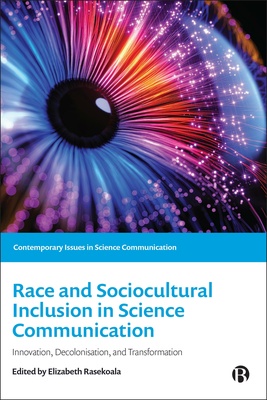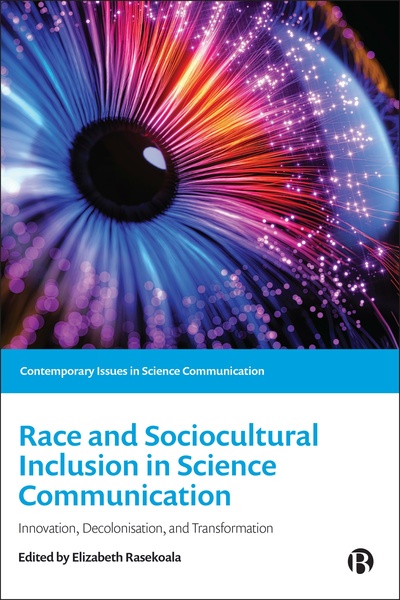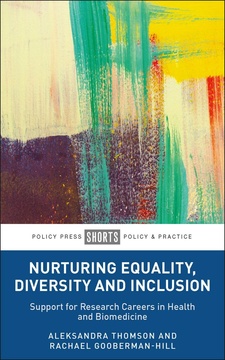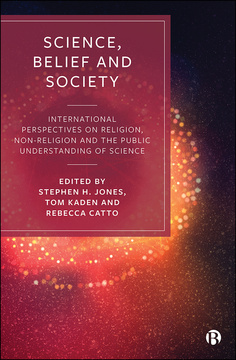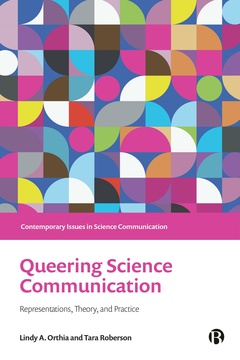Race and Sociocultural Inclusion in Science Communication
Innovation, Decolonisation, and Transformation
Edited by Elizabeth Rasekoala
Published
Jan 21, 2025Page count
280 pagesBrowse the series
Contemporary Issues in Science CommunicationISBN
978-1529226805Dimensions
234 x 156 mmImprint
Bristol University PressPublished
Jul 31, 2023Page count
280 pagesBrowse the series
Contemporary Issues in Science CommunicationISBN
978-1529226799Dimensions
234 x 156 mmImprint
Bristol University PressPublished
Jul 31, 2023Page count
280 pagesBrowse the series
Contemporary Issues in Science CommunicationISBN
978-1529226812Dimensions
234 x 156 mmImprint
Bristol University PressPublished
Jul 31, 2023Page count
280 pagesBrowse the series
Contemporary Issues in Science CommunicationISBN
978-1529226812Dimensions
234 x 156 mmImprint
Bristol University PressChapter 12, 'Decolonising Science Communication in the Caribbean', is available Open Access via Bristol University Press Digital.
Recipient of the CIMUSET Special Recognition Award.
Chapter 12 is available Open Access under CC-BY-NC-ND licence.
Conversations around diversity, equity, and inclusion in science communication are in danger of generating much concern without effecting change and systematic transformations.
This radical volume addresses these circular discourses and reveals the gaps in the field. Putting the spotlight on the marginalised voices of so-called 'racialised minorities', and those from Global South regions, it interrogates the global footprint of the science communication enterprise.
Moving beyond tokenistic and extractive approaches, this book creates a space for academics and practitioners to challenge issues around race and sociocultural inclusion, providing mutual learning, paradigm-shifting perspectives, and innovative ways forward for the science communication advancement agenda.
This work has received Special Recognition from the CIMUSET Award Committee.
“This edited collection is a seminal work that not only highlights the historical and contemporary challenges related to race, gender, and social class but also offers innovative, globally inclusive, and action-oriented solutions aimed at driving systemic and sustainable change. A visionary and impactful book that addresses one of the most pressing issues in contemporary science communication and for science museums and science centres.” CIMUSET Award Committee
"This powerful and purposefully uncomfortable book pinpoints how inequalities shape current science communication practices, theories, and narratives, and convincingly calls for radical change." Barbara Streicher, Austrian ScienceCenter-Network
"I don’t think that I am overstating the importance of this book when I say it really does place a line in the sand of science communication before and how we think about science communication afterwards. Since reading the book and reflecting on what I have learned, I genuinely feel this book should be essential reading for all science communicators and science communication stakeholders, including museum workers and staff…This book needed to be written, but more importantly, it really needs to be read." Laura Bowater, University of Plymouth
Elizabeth Rasekoala is the President of African Gong: The Pan-African Network for the Popularization of Science and Technology and Science Communication. She is the first African female recipient of an International Science Communication award, the NAT AWARD 2019, conferred by the Natural Science Museum of Barcelona.
Introduction – Elizabeth Rasekoala
Part I: The Practice(s) of Science Communication: Challenges and Opportunities for Race, Gender, Language and Epistemic Diversity, Representation and Inclusion
1. Inclusion Is More Than an Invitation: Shifting Science Communication in a Science Museum – C. James Liu, Priya Mohabir, Dorothy Bennett
2. Communicating Science On, to, and With Racial Minorities During Pandemics – John Noel Viana
3. Breaking the Silos, Science Communication for All – Amparo Leyman Pino
4. Building Capacity for Science Communication in South Africa: Afrocentric Perspectives From Mathematical Scientists – Mpfareleni Rejoyce Gavhi-Molefe and Rudzani Nemutudi
Part II: Science Communication in the Global South: Leveraging Indigenous Knowledge, Cultural Emancipation and Epistemic Renaissance for Innovative Transformation
5. Challenges of Epistemic Justice and Diversity in Science Communication in Mexico: Imperatives for Radical Re-Positioning Towards Transformative Contexts of Social Problem Solving, Cultural Inclusion and Trans-Disciplinarity – Susana Herrera-Lima and Sofía Gutiérrez-Ramírez
6. Past, Present and Future: Perspectives on the Development of an Indigenous Science Communication Agenda in Nigeria – Temilade Sesan and Ayodele Ibiyemi
7. Harnessing Indigenous Knowledge Systems for Socially Inclusive Science Communication: Working Towards a “Science for Us, With Us” Approach to Science Communication in the Global South – Konosoang Sobane, Wilfred Lunga and Lebogang Setlhabane
8. Indigenous Science Discourse in the Mainstream: The Case of ‘Mātauranga and Science’ in New Zealand Science Review – Ocean Ripeka Mercier and Anne-Marie Jackson
Part III: The Decolonisation Agenda in Science Communication: Deconstructing Eurocentric Hegemony, Ideology and Pseudo-Historical Memory
9. Decolonising Initiatives in Action: From Theory to Practice at the Museum of Us – Brandie Macdonald and Micah Parzen
10. Falling From Normalcy? Decolonisation of Museums, Science Centres & Science Communication – Mohamed Belhorma
11. African Challenges and Opportunities for Decolonised Research-Led Innovation and Communication for Societal Transformation – Akanimo Odon
12. Decolonising Science Communication in the Caribbean: Challenges and Transformations in Community-Based Engagement With Research on the ABCSSS Islands – Tibisay Sankatsing Nava, Roxanne-Liana Francisca, Krista T. Oplaat and Tadzio Bervoets
Part IV: The Globally Diverse History of Science Communication: Deconstructing Notions of Science Communication as a Modern Western Enterprise
13. Shen Kua’s Meng Hsi Pi T’an (c. 1095 CE): China’s First Notebook Encyclopaedia as a Science Communication Text – Ruoyu Duan, Biaowen Huang and Lindy A. orthia
14. Making Knowledge Visible: Artisans, Craftsmen, Printmakers and the Knowledge Sharing Practices of 19th-Century Bengal – Siddharth Kankaria, Anwesha Chakraborty and Argha Manna
15. Advancing Globally Inclusive Science Communication: Bridging the North-South Divide Through Decolonisation, Equity, and Mutual Learning – Elizabeth Rasekoala







